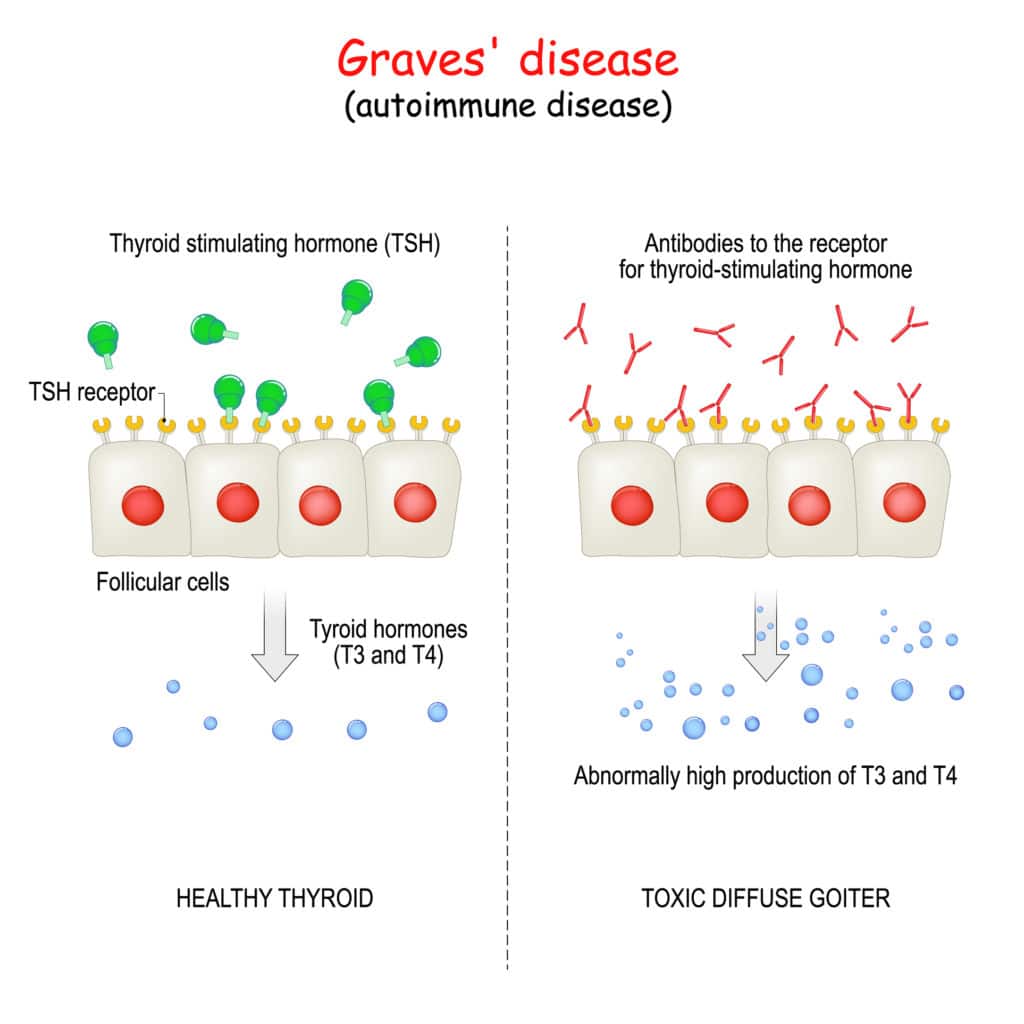What is graves disease?
Graves’ disease is an autoimmune thyroid disease and is the main cause of hyperthyroidism. In Graves’ disease, antibodies produced by the body attacks the thyroid gland and can cause it to become overactive and produce too much thyroid hormone production.
Causes of Graves disease
Graves’ disease is caused by a problem in the body’s defence mechanism. It is not known why this happens.
Antibodies are normally produced by the body’s immune system to fight foreign substances and disease-causing microorganism. In Graves’ disease, the body sees the thyroid gland as the foreign object and produces a unique and abnormal antibody called thyroid-stimulating immunoglobulin to attack it.
Thyroid-stimulating immunoglobulin mimics the function of thyroid-stimulating hormone (TSH). Remember the TSH is the hormone which stimulates the thyroid gland to produce thyroid hormone and growth of thyroid. So thyroid-stimulating immunoglobulin mimics TSH by binding to its receptor (TSH receptors) which stimulate the thyroid gland to produce thyroid hormones and to also stimulate thyroid growth. This can lead to overproduction of thyroid hormones.

Symptoms of graves disease
- Anxiety
- Irritability
- Nervousness
- Emotional instability
- Fatigue (feeling tired all the time)
- Heat intolerance
- Muscle weakness
- Itchiness
- Sleep disturbance
- Loss of interest in sex
- Dizziness
- Shortness of breath
- Strong feeling of hunger
- Diarrhoea
- Frequent urination
- Constantly feeling thirsty
- Unable to stay still (hyperactivity)
Signs of graves disease
- Weight loss- despite normal or increased appetite.
- Shaky hands
- Goitre
- Bulging eyes (Graves’ ophthalmopathy)
- Warm moist skin
- Palpitation (fast or irregular heartbeat)
- Change in menstrual cycles.
- Thick, red skin on shins or/and tops of feet (Graves’ dermopathy)
Graves’ eye disease (Graves’ Ophthalmopathy or Graves’ Orbitopathy )
Graves’ eye disease, also referred to as Graves’ ophthalmopathy, is an eye condition that occurs in about 30% of people with hyperthyroidism caused Graves’ disease. These eye symptoms are usually mild and easily treated.
Causes of Graves eye disease?
The exact process by which Graves’ eye disease occurs is not known.
Some researchers believe that the same antibodies which attacks the thyroid gland as explained above also attack the tissues and muscles surrounding the eyes because they contain similar proteins. However, some people Graves’ eye disease does not have these immune system abnormalities which suggests that Graves’ eye disease could be due to other abnormal antibodies or other causes.
This eye disorder causes swelling of tissues, muscles and fat in the eye socket which ultimately causes bulging eyes (exophthalmos). There may also be retraction of the eyelids which exposes the cornea of the eyes to infections. In advance eye disease, the muscles that help in moving the eyeballs can become very stiff and make it difficult to move. The swelling can also put too much pressure on the optic nerve and impair vision.
Symptoms of Graves’ eye disease
- Bulging eyes (exophthalmos)
- Gritty or irritating sensation in the eyes
- Pressure or pain in the eyes
- Reddened or inflamed conjunctiva (white area in eyes)
- Double vision
- excessive tearing or dry eyes
- Sensitivity to light
In severe eye disease you may experience
- Vision loss (rarely)
- Eyelid retraction (inability to close the eyes)
- Swelling of the eyes
- Reduced eye movement and eyelids
- Compression of the optic nerve.
- Corneal ulceration
Diagnosis of Graves’ eye disease
- Eye examination by doctor
- Computed tomography (CT) scan or magnetic resonance imaging (MRI) scan of the eye muscles.
- Presence of other symptoms overactive thyroid though Graves’ eye disease can occur even when the thyroid is not overactive and with no other associated symptoms of overactive thyroid.
How long will Graves’ eye disease last?
While Graves’ eye disease can improve on its own. Some people may still continue to experience, symptoms despite treatment of both hyperthyroidism and Graves’ eye disease.

Prevention of Graves’ eye disease
Graves’ disease and Graves’ eye disease cannot usually be prevented.
Prognosis of Graves’ eye disease
Nearly all symptoms of Graves’ disease and Graves’ eye disease can be treated successfully.
Diagnosis of Graves disease
To support in the diagnosis of a Graves disease, your doctor may conduct a physical exam and ask you about signs and symptoms associated with Graves’ disease. Questions about family and past medical history may still be asked a request for blood tests to measure the levels of TSH, T4, T3 and TRab.
Normal or lower TSH levels with higher-than-normal levels of thyroid hormones usually means the person has Graves’ disease. You may also be asked to do a test to measure the levels of an antibody known to cause Graves’ disease (TRAb). Absent of these antibodies might suggest hyperthyroidism due to other causes. Read up more on testing for TSH, thyroid hormones and antibodies here.
- Blood tests to show the level of TSH, T4, T3 and TRAb
- Radioactive iodine uptake
- Ultrasound of the thyroid gland is enlarged.
- Imaging tests such as a CT scan or MRI.
TSH
This hormone stimulates the thyroid gland to produce thyroid hormones.
T3 and T4
These are two hormones produced by the thyroid gland.
Read about these hormones in details in the thyroid disease page.
Graves disease antibodies
Thyrotropin receptor antibody (TRAb) test is a blood test to measure the presence of this Graves’ disease antibodies that can help in the diagnosis the autoimmune thyroid disease.
The thyrotropin receptor antibody (TRAb) is the antibody associated with Graves’ disease (or Graves’ disease antibodies) and is present in 90% of the people who have Graves’ disease. Normally, TSH stimulates the thyroid gland to produce the thyroid hormones. In Graves’ Disease, TRAb overrides this normal regulation of the thyroid by stimulating the thyroid gland and cause it to become overactive and produce two much thyroid hormones (hyperthyroidism).
Radioactive iodine uptake
To do this, you ingest a small amount of radioactive iodine and then measure the amount absorbs it into the thyroid gland. This can help determine if hyperthyroidism is caused by Graves’ disease or another condition.
Treatment for graves disease
Graves disease is treated by:
- Radioactive iodine therapy
- Anti-thyroid medications
- Beta blockers
- Surgery
Read the section on treatment of hyperthyroidism for more details on how the above can be used to treat Graves disease.
Treatment of Graves’ Ophthalmopathy
You can do these to help soothe your eyes and improve vision if you have Graves’ Ophthalmopathy.
Treat the hyperthyroidism as above if eye disease is with overactive thyroid.
Apply cool compresses to eye.
Wear sunglasses to help with sensitivity to light.
Using artificial tears to relief irritating eyes.
Sleeping with elevated head of bed to reduce eyelid swelling.
For double vision you may be prescribed glasses with prisms or have surgery performed on the eye muscles.
Steroids (Corticosteroids) may improve swelling in the eyes. High doses are used when there is presence of the compression of the optic nerve.
Taking selenium supplement may help reduce swelling of the eyes.
Using immune suppressing drugs like mycophenolate or rituximab to suppress immune activity.
Eyelid surgery to reposition the eyelids and help reduce the irritation.
Is graves disease fatal?
Yes. Graves disease that is not treated can rarely cause thyroid storm which can be fatal.
What is the relationship between graves disease and hyperthyroidism?
Most hyperthyroidism is caused by graves disease.
Is graves disease hyperthyroidism?
Graves disease is the main cause of hyperthyroidism. However, there are hyperthyroidism that is caused by other things. see causes of hyperthyroidism for more.
Is graves disease curable
Yes graves disease can be cured. See treatment section.
About the author
Nwasom is a pharmacy graduate and a pharmacist currently practising in the United Kingdom. I have great experience communicating with patients and their family as gained through working as a pharmacist in both the hospital and community pharmacy sector. I love writing so it was a natural thing to try and pass medical and health information on through writing.




